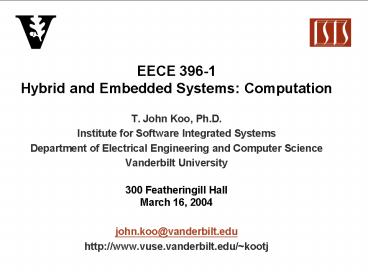EECE 396-1 Hybrid and Embedded Systems: Computation - PowerPoint PPT Presentation
1 / 55
Title:
EECE 396-1 Hybrid and Embedded Systems: Computation
Description:
EECE 396-1 Hybrid and Embedded Systems: Computation T. John Koo, Ph.D. Institute for Software Integrated Systems Department of Electrical Engineering and Computer Science – PowerPoint PPT presentation
Number of Views:191
Avg rating:3.0/5.0
Title: EECE 396-1 Hybrid and Embedded Systems: Computation
1
EECE 396-1Hybrid and Embedded Systems
Computation
- T. John Koo, Ph.D.
- Institute for Software Integrated Systems
- Department of Electrical Engineering and Computer
Science - Vanderbilt University
- 300 Featheringill Hall
- March 16, 2004
- john.koo_at_vanderbilt.edu
- http//www.vuse.vanderbilt.edu/kootj
2
Computational Tool Reachability
3
Transition System
Initial set
Unsafe Set
4
Hybrid Automaton
5
Hybrid Automaton
6
Reachable Sets
7
Reachable Sets
8
Reachable Sets
9
Reachable Sets
10
Reachable Sets
11
Reachable Sets
12
Reachability Problem
13
Reachability Problem
14
Reachability Problem
15
Reachability Problem
16
Reachability Algorithm
17
Reachability Algorithm
18
Reachability Algorithm
Unsafe!!
19
Reachability Algorithm
Safe!!
20
Reachability Algorithm
Keep iterating until when!?
21
Reachability Algorithm
22
Reachability Algorithm
23
Reachability Algorithm
Keep iterating until when!?
24
Deciability
Keep iterating until when!?
25
Deciability
Keep iterating until when!?
26
Computational tools
- Basic computation includes
- Set-theoretic operations Union, Intersection,
Difference - Reach set computations Postd, Postc, Pred, Prec
- Verification
- Safety Property
- Forward algorithm
- Backward algorithm
- Liveness Property
- Properties specified by Temporal Logics
- Ref Thomas A. Henzinger, The Symbolic Approach
to Hybrid Systems, (CAV02), UC Berkeley.
27
Computational tools
- d/dt Library contributed by Thao Dang
- System Dynamics
- Linear systems
- Affine systems
- Linear systems with bounded inputs
- Set Representation
- Convex sets
- Basic (approximate) computation includes
- Set-theoretic operations Union, Intersection,
Difference - Reach set computations Postd, Postc, Pred, Prec
- Verification
- Specifications written as Temporal Logic Formula
- Algorithms
28
Computational tools
- Projects
- Temporal Logic specifications
- Algorithms derivation
- d/dt based computational tool
- Verification
- Synthesis
- DC-DC Converters
- Controller verification
- Controller synthesis
29
Computational tools
Temporal Logic
Specification
Input
Algorithm
Data Structure
Set Operations
Reach Sets
Dynamics
Output
30
Design ExampleDC-DC Converters
31
Power Electronics
- Power electronics found in
- DC-DC converters
- Power supplies
- Electric machine drives
- Circuits can be defined as networks of
- Voltage and current sources (DC or AC)
- Linear elements (R, L, C)
- Semiconductors used as switches (diodes,
transistors)
32
Power Electronics
- Discrete dynamics
- N switches, (up to) 2N discrete states
- Only discrete inputs (switching) some discrete
transitions under control, others not - Continuous dynamics
- Linear or affine dynamics at each discrete state
33
Power Electronics DC-DC Converters
- Have a DC supply (e.g. battery), but need a
different DC voltage - Different configurations depending on whether
VinltVout or VingtVout - Control switching to maintain Vout with changes
in load (R), and Vin
34
Two Output DC-DC Converter
- Want two DC output voltages
- Inductors are big and heavy, so only want to use
one - Similar to two tank problem
35
Circuit Operation
- One and only one switch closed at any time
- Each switch state has a continuous dynamics
36
Design Objective
iL ?, VoutA?, VoutB ?
iL?, VoutA?, VoutB?
iL ?, VoutA ?, VoutB?
Objective Regulate two output voltages and limit
current by switching between three discrete
states with continuous dynamics.
37
Typical Circuit Analysis/Control
- Governing equations
- Time domain, steady state
- Energy balance
- System dynamics
- Discretization in time
- Switched quantity only sampled at discrete
instants - Assumes a fixed clock
- Averaging
- Switched quantity approximated by a moving
average - Assumes switching is much faster than system time
constants - Control
- Linearize with duty (?) as input
- Use classical control techniques
iL(t)
iL(t)
iLk
38
Problem Formulation
39
Design ExampleDC-DC ConvertersController
Synthesis - Feasibility
40
Problem Formulation
- Parallel Composition of Hybrid Automata
- Given a collection of Modes and Edges, design
Guards
41
Problem Formulation Hybrid Automaton
42
FormulationCapacitor Discharging Mode (q1)
43
FormulationCapacitor Charging Mode (q2)
44
Backward Reachable sets (qualitative) w q2 q1
q1
q2
45
d/dt Calculations result (quantitative)w q2
q1
NOT FEASIBLE
46
Backward Reachable sets (qualitative) w q1
q2
q1
q2
47
d/dt Calculations result (quantitative)w q1
q2
FEASIBLE
48
(No Transcript)
49
Design ExampleDC-DC ConvertersController
Synthesis Switching Surfaces
50
(No Transcript)
51
Switching Surface (Guard) Go Forward!w q1
q2
q1
q1
52
Design ExampleDC-DC ConvertersController
Synthesis Simulation
53
Problem Formulation
- Parallel Composition of Hybrid Automata
- Given a collection of Modes and Edges, design
Guards
54
Semi-Analytic Calculation of Switching Time
tsw0.158 ms
tsw0.174 ms
55
End































